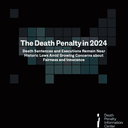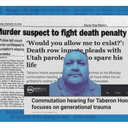
The federal government conducted its sixth and seventh executions in ten weeks on September 22 and 24, putting William Emmett LeCroy (pictured) and Christopher Vialva to death amid continuing challenges to the federal execution protocol and to carrying out executions during the COVID-19 pandemic. As the federal appeal courts set aside LeCroy’s execution challenges, Vialva’s lawsuit challenging the legality of the federal execution protocol remained pending in the U.S. Supreme Court. After the Court denied Vialva’s stay application and petition for review, his execution moved forward on September 24.
The federal government’s resumption of executions has been complicated by concerns that the execution protocol adopted by the Department of Justice in 2019 violates the U.S. Constitution and federal statutes and regulatory procedures. A federal lawsuit about the execution protocol prevented the government from restarting executions in December 2019 and resulted in several preliminary injunctions in summer of 2020. Each of those injunctions was later dissolved, either by the federal circuit courts of appeal or by the U.S. Supreme Court, allowing the federal executions to take place.
The weekend before the latest executions, Judge Tanya Chutkan of the U.S. District Court for the District of Columbia issued several rulings in the federal death-row prisoners’ execution protocol lawsuit. On September 20, 2020, the district court granted the death-row prisoners’ motion for partial summary judgment on their claim that the federal execution protocol violates the Food, Drug, and Cosmetic Act (FDCA), holding that the government’s use of pentobarbital in federal executions violates the FDCA’s premarketing, labeling, and prescription requirements. However, the court denied the prisoners’ motion for a preliminary injunction, ruling that the prisoners had not shown they would suffer irreparable harm as a result of the violation. In refusing to halt future executions, the court relied heavily on the fact that appellate courts had reversed all of the previous injunctions it had issued in the prisoners’ favor.
The district court’s denial of relief also set the stage for federal executions to continue pursuant to an execution protocol that the court has deemed illegal.
The district court also granted the government summary judgment on the rest of the prisoners’ Administrative Procedure Act claims and dismissed the remaining claims. The court reserved judgment on an Eighth Amendment claim brought by Norris Holder challenging the application of the execution protocol based on facts specific to his case.
The same day, the district court denied a separate motion by LeCroy seeking to halt his execution based on arguments that the federal execution protocol violates the Federal Death Penalty Act and Article II of the U.S. Constitution, which requires that the President “take care that the laws be faithfully executed.”
LeCroy had also sought to have his execution rescheduled because the federal government’s choice to put him to death during the COVID-19 pandemic denied him access to counsel for critical pre-execution litigation and clemency proceedings. The pleadings explained that LeCroy’s lead counsel had pre-existing medical conditions that placed him at high risk of death or severe COVID-19 illness, and as a result was unable to meet with LeCroy as he faced imminent execution or attend the execution. Shortly before 7:30 p.m. Eastern, 1 – 1/2 hours after the execution was scheduled to begin, the U.S. Supreme Court denied LeCroy’s application for stay of execution on this issue. Following an additional unexplained hour-long delay after the witnesses were assembled, LeCroy’s execution went forward, and he was declared dead at 9:06 p.m. Eastern.
The legality of the federal execution protocol remained an issue in Vialva’s case. Vialva asked the U.S. Supreme Court to stay his execution to review the decision of the U.S. Court of Appeals for the Fifth Circuit denying his challenge to the federal execution protocol. His petition for review requested an injunction against his execution, arguing that the federal government violated the Federal Death Penalty Act and the trial court’s order in setting his execution date.
Michael Tarm, US government executes killer obsessed with witchcraft, Associated Press, September 23, 2020; Jennifer Henderson and Steve Almasy, Federal government executes inmate who blamed murder victim for using witchcraft on him, CNN, September 22, 2020.
Read the district court’s September 20, 2020 decision granting partial summary judgment, denying a preliminary injunction, and dismissing some execution protocol claims here and the September 21 decision denying LeCroy’s separate motion for preliminary injunction here.



